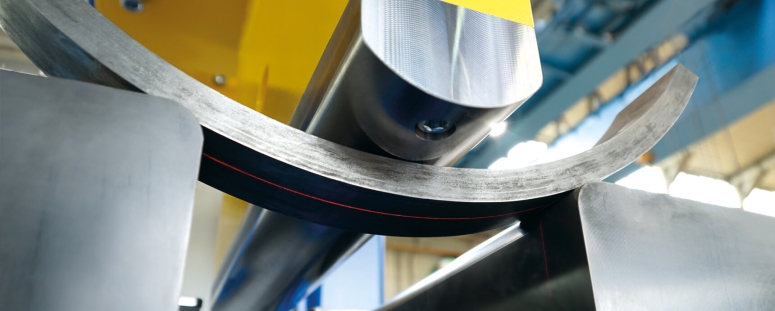Graebener® is a medium-sized, family owned machine building company with locations in Netphen (Germany), Houston (USA) and Shanghai (China) as well as a variety of international representatives. Based on 100 years of experience in the metal processing business we develop and realize customized solutions for the core markets of automotive industries, hydroforming, manufacturing of large pipes, shipbuilding, wind tower production, vessel construction and renewable energies. Our product range includes hydraulic forming lines, milling and bending machines, calibration and straightening presses as well panel production lines. Graebener® stands for a holistic approach. As technology and system partner we accompany our customers along the entire process chain – from the initial idea, comprehensive engineering (including hydraulics, automation and control technology as well as intelligent Industry 4.0 applications) up to customized new machines or retrofitted existing lines.
RadiiPro®: Electronic radius measurement system in real time
To this day in large pipe manufacturing, the production large-diameter pipes in a step-by-step process is set up and monitored manually using templates. This is time-consuming and requires well-trained machine operators. Graebener®, in cooperation with fabforce®, has now developed a radius measurement system that allows the radius to be checked conveniently, safely and precisely via a monitor. In addition to this, the system offers insights into the material behavior of the pipe. An important milestone on the way to a fully automated bending process.
Since the beginning of large-diameter pipe production, it has been common practice to check the individual steps in the bending process using a template. In other words, the operator interrupts the bending process at regular intervals and measures the result using an analog template which he places on the partially bent pipe. For this purpose, the machine must be switched to safe mode and the operator has to leave his operator desk. During all this time, the machine is not working productively. Therefore, the time exposure and the costs of manual measuring are quite significant. The industry has long been striving for an uncomplicated and cost-effective solution. Graebener® has taken up the issue and, in cooperation with fabforce®, a company specializing in Industry 4.0 applications, has developed a digital template that paves the way to a fully automated pipe bending process in the medium term.
The RadiiPro® radius measurement system uses a laser system that transfers the contour in the bending process to the operator's screen in real time. The trick: the measurement system is located in the lower tool and can therefore measure live during the entire bending process, even under load. At the same time, the software compares the bending of the contour with the desired target radius and calculates the contour deviations. This way, the forming differences without load and under load can be seen. The result is displayed precisely and objectively within milliseconds on a screen in the operating panel. For this reason, non-productive times of manual measuring as well as possible misinterpretations when placing the template are avoided. In addition to this, the information obtained can be saved for each pipe, enabling transparent quality management right up to the final product.
But the RadiiPro® application has even more to offer: the calculation of the local curvature of the contour. A characteristic value with considerable potential. This value offers the advantage that the degree of current deformation can be displayed with high precision even on very small measuring sections. This way it can be seen in minute detail which areas are actually formed and in what way. The operator gains information about the optimum bending step width, the correct tolerance values and the evenness of the pipe. Incidentally, the data of the curvature also allow a multitude of further conclusions, e. g: Does the steel mill supply the correct quality? How can the workpiece properties be ideally reacted to in subsequent processes? Does the quality vary within the component or batch and, if so, within which tolerances?
Fabian Kapp, Managing Partner at fabforce®, sums up the advantages in a nutshell: "No matter how qualified an individual operator may be, a human being cannot in fact keep up with the precision and speed of our measurement system. Added to this is the safety advantage and the immense additional gain in information. Our application offers our customers the opportunity to clearly set themselves apart from the competition and to lay an important foundation for the digitalization of their pipe mills".
In the medium term, Graebener® and fabforce® are even aiming at full automation of the entire pipe bending process. "This would then allow the forming of any common material quickly and in highest quality - without any operator training, without corrections and without non-productive time," says Hubertus Valpertz, Authorized Officer and Technical Sales Manager at Graebener®.
fabforce® has also specialized in the backup and evaluation of machine data. In connection with the RadiiPro® data, there is huge potential for process optimization: from tracking the pipe quality through the entire production process up to the monitoring and maintaining of the machine quality over the entire life cycle.
Metal-Interface takes great care to protect your privacy: when you submit a request or ask a question, your personal information is passed on to the supplier concerned or, if necessary, to one of its regional managers or distributors, who will be able to provide you with a direct response. Consult our Privacy Policy to find out more about how and why we process your data, and your rights in relation to this information. By continuing to browse our site, you accept our terms and conditions of use.
 EuroBLECH 2022 Press release
EuroBLECH 2022 Press releaseRadiiPro®: Electronic radius measurement system in real time
Published on 20/09/22
